
Frontline Gastroenterology
Scope & Guideline
Innovating Insights in Gastrointestinal Health
Introduction
Aims and Scopes
- Clinical Management Strategies:
The journal publishes studies that explore clinical management strategies for various gastrointestinal disorders, emphasizing evidence-based practices and quality improvement initiatives. - Innovations in Endoscopic Techniques:
There is a consistent focus on advancements in endoscopic techniques, including new methodologies, training, and evaluations of procedural efficacy. - Liver Disease Research:
Research related to liver diseases, including hepatitis, cirrhosis, and liver cancer, is a core area, addressing both clinical management and emerging therapeutic options. - Inflammatory Bowel Disease (IBD) Studies:
The journal has a strong emphasis on IBD, exploring its pathophysiology, treatment options, and the psychosocial aspects affecting patients. - Public Health and Epidemiology:
Public health perspectives, including epidemiological studies on gastrointestinal diseases, risk factors, and preventive measures, are integral to the journal's scope. - Sustainability in Gastroenterology:
A unique contribution of the journal includes addressing the environmental impact of gastroenterology practices, promoting sustainability and green initiatives.
Trending and Emerging
- Telemedicine and Virtual Care:
The integration of telemedicine in gastroenterology, particularly in the context of post-COVID-19 care, is gaining traction, with studies exploring patient outcomes and satisfaction. - Psychosocial Aspects of Gastrointestinal Disorders:
There is an increasing focus on the psychological impact of gastrointestinal diseases on patients, particularly in relation to IBD and chronic liver disease. - Environmental Sustainability Practices:
Research addressing the environmental sustainability of gastroenterology practices is emerging, with a focus on reducing the carbon footprint and improving healthcare practices. - Patient-Centered Care Models:
There is a trend towards exploring patient-centered care models, emphasizing shared decision-making and individualized treatment plans in managing gastrointestinal diseases. - Real-World Evidence and Health Economics:
The journal is increasingly publishing studies that utilize real-world evidence to assess treatment effectiveness and economic evaluations, reflecting a shift towards practical implications of research.
Declining or Waning
- Traditional Diagnostic Methods:
There is a noticeable decrease in studies focusing on traditional diagnostic methods for gastrointestinal diseases, as newer, less invasive techniques gain preference. - General Gastroenterology Topics:
Research that does not focus on specific diseases or conditions (e.g., general reviews or non-specific clinical practices) appears to be declining in favor of more targeted studies. - Single-Center Studies:
The prevalence of single-center studies has waned, as there is a growing emphasis on multicenter collaborations and larger cohort studies to enhance the generalizability of findings.
Similar Journals
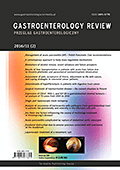
Gastroenterology Review-Przeglad Gastroenterologiczny
Empowering Global Collaboration in GI ScienceGastroenterology Review-Przeglad Gastroenterologiczny is a premier, peer-reviewed journal published by TERMEDIA PUBLISHING HOUSE LTD, focusing on the dynamic field of gastroenterology. Since its inception in 2006, it has embraced an Open Access model, ensuring that the latest research is readily accessible to a global audience, fostering collaboration and innovation. Based in Poland, this journal serves as a crucial platform for disseminating significant findings in gastrointestinal research, with a current Scopus rank placing it at the 39th percentile in its category. With a commitment to advancing the understanding of gastroenterological conditions, *Gastroenterology Review* publishes original articles, reviews, and case studies that contribute to both clinical practice and academic research. The journal is particularly aimed at researchers, healthcare professionals, and students who ignite dialogues that shape the future of gastrointestinal health. Explore the comprehensive insights that this journal offers, as it encapsulates vital developments from 2008 to 2024 in the ever-evolving landscape of gastroenterology.

Clinical Gastroenterology and Hepatology
Innovating Insights for Digestive HealthClinical Gastroenterology and Hepatology, published by Elsevier Science Inc, stands as a leading journal in the fields of gastroenterology and hepatology. With an ISSN of 1542-3565 and an E-ISSN of 1542-7714, this esteemed publication has earned its place in the top quartile (Q1) of both gastroenterology and hepatology categories as of 2023, ranking 6th out of 167 and 7th out of 82 respectively. The journal aims to disseminate innovative research, clinical studies, and case reports that advance the understanding and treatment of gastrointestinal and liver diseases. Targeted towards researchers, healthcare professionals, and students, it provides crucial insights into emerging therapies and medical advancements. Clinical Gastroenterology and Hepatology is not only a pivotal resource for contemporary gastroenterological research but also fosters collaboration and knowledge-sharing within the medical community. With a converging publication history from 2003 to the present, the journal continues to build on its solid foundation of scientific excellence and relevance.
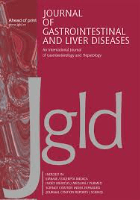
Journal of Gastrointestinal and Liver Diseases
Driving Impactful Discoveries in Digestive HealthThe Journal of Gastrointestinal and Liver Diseases, published by MEDICAL UNIV PRESS in Romania, serves as a pivotal platform for the dissemination of significant research in the fields of gastroenterology and hepatology. Established in 2006, this journal has evolved over the years, currently holding a Q3 rank in Gastroenterology and a Q2 rank in Medicine (miscellaneous), reflecting its commitment to high-quality scholarship and impactful contributions to medical science.
With an ISSN of 1841-8724 and an E-ISSN of 1842-1121, the journal engages a diverse readership of researchers, clinicians, and students passionate about advancing knowledge in gastrointestinal and liver health. While it currently does not operate under an open access model, the journal remains a vital resource for those seeking to stay updated on the latest developments and emerging trends in the field. As it converges towards a broader impact, projected through its coverage until 2024, the Journal of Gastrointestinal and Liver Diseases continues to contribute to the academic landscape, encouraging innovation and comprehensive understanding in digestive health.
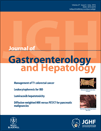
JOURNAL OF GASTROENTEROLOGY AND HEPATOLOGY
Innovative insights into digestive and liver health.Welcome to the JOURNAL OF GASTROENTEROLOGY AND HEPATOLOGY, an esteemed publication in the field of gastroenterology and hepatology, proudly published by WILEY. Established in 1986, this journal serves as a crucial platform for researchers, healthcare professionals, and students, presenting groundbreaking research and comprehensive reviews that drive advances in understanding and treating gastrointestinal and liver diseases. With a strong reputation evidenced by its Q1 ranking in gastroenterology and Q2 ranking in hepatology, this journal ranks impressively in the Scopus metrics - positioned at #22 out of 167 in gastroenterology and #21 out of 82 in hepatology, reflecting its contribution to scholarly excellence. Although it does not offer open access options, the journal’s rich archive and diverse topics make it indispensable for those dedicated to improving patient outcomes in these critical areas of medicine. Whether you are a seasoned researcher or an aspiring medical professional, engaging with this journal will keep you at the forefront of the latest developments and emerging trends in gastroenterology and hepatology research.
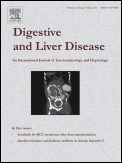
DIGESTIVE AND LIVER DISEASE
Pioneering insights for a healthier tomorrow.DIGESTIVE AND LIVER DISEASE is a prominent journal published by Elsevier Science Inc, dedicated to advancing the field of gastroenterology and hepatology. With an ISSN of 1590-8658 and an E-ISSN of 1878-3562, this journal has established itself as a significant resource within the academic community, especially considering its Q2 ranking in both gastroenterology and hepatology categories as of 2023. Spanning from 2000 to 2024, the journal presents a diverse array of peer-reviewed articles, clinical studies, and review papers that explore the latest advancements and research findings in digestive and liver diseases. The journal's robust impact, reflected in its Scopus rankings—40th out of 167 in gastroenterology and 28th out of 82 in hepatology—highlights its critical role in shaping practices and understanding in these vital areas of medicine. With open access options available, DIGESTIVE AND LIVER DISEASE aims to make high-quality research accessible to a wider audience, thereby encouraging collaboration and innovation. Researchers, healthcare professionals, and students alike will find valuable insights into the complex mechanisms, diagnostics, and therapeutic strategies pertinent to digestive and liver health.
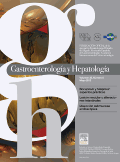
Gastroenterologia y Hepatologia
Unveiling insights that shape the future of digestive health.Gastroenterologia y Hepatologia, published by Elsevier España SLU, is a distinguished journal dedicated to advancing the fields of gastroenterology and hepatology. With a publication history spanning from 1982 to 2024, this journal is recognized for its commitment to disseminating high-quality research and reviews that address critical developments in the diagnosis and treatment of gastrointestinal and liver diseases. Although it currently ranks in the Q3 quartile in both gastroenterology and hepatology based on the 2023 metrics, the journal continues to attract a global audience of researchers, healthcare professionals, and students eager to engage with the latest findings. The journal is accessible in both print and electronic formats (ISSN: 0210-5705), making its valuable insights reachable to a broad spectrum of subscribers. By fostering a platform for rigorous scholarly communication, Gastroenterologia y Hepatologia plays a vital role in shaping the future of research in these essential medical fields.

Canadian Journal of Gastroenterology and Hepatology
Fostering Collaboration in Gastrointestinal and Liver StudiesCanadian Journal of Gastroenterology and Hepatology, published by HINDAWI LTD, serves as a vital resource in the fields of gastroenterology and hepatology. Since its inception in 1987, this open-access journal has made significant contributions to advancing research and clinical practice through its comprehensive coverage of topics ranging from liver diseases to gastrointestinal disorders. With an impressive Q2 ranking in Gastroenterology and a Q3 ranking in Hepatology as of 2023, the journal has established itself as an influential platform for researchers and healthcare professionals seeking to disseminate and acquire knowledge. The journal is based in Egypt, with its operational headquarters located in London, England. Notably, it holds a respectable standing in Scopus rankings, placed at Rank #64 in Gastroenterology and Rank #34 in Hepatology, reflecting its impact and relevance in the medical community. With a commitment to quality and accessibility, the Canadian Journal of Gastroenterology and Hepatology continues to foster innovation and collaboration among its readers.

Indian Journal of Gastroenterology
Connecting Researchers and Practitioners in GastroenterologyThe Indian Journal of Gastroenterology, a prominent publication in the field of gastroenterology, is published by Springer India. With roots dating back to 1982 and an ongoing commitment to disseminating high-quality research, this journal serves as a vital platform for researchers, practitioners, and students interested in gastrointestinal health and diseases. It boasts an impressive track record with a Scopus rank of #82 in the gastroenterology category and a 2023 quartile ranking of Q3, firmly situating it within the competitive landscape of medical journals. Although it is not an open-access journal, the Indian Journal of Gastroenterology offers accessible research articles contributing significantly to the field, facilitating informed discussion and advancing knowledge in gastrointestinal medicine. The journal's comprehensive focus covers a wide range of topics from clinical studies to innovative therapeutic approaches, ensuring its relevance to current medical practices and the evolving challenges in gastroenterology.

Translational Gastroenterology and Hepatology
Unlocking Innovations for Liver and Gut Health.Translational Gastroenterology and Hepatology, published by AME Publishing Company, stands as a pivotal platform for advancing the understanding and treatment of gastrointestinal and liver diseases. With its focus on translational research, this journal aims to bridge the gap between laboratory discoveries and clinical applications, thus fostering improvements in patient care. Although specific metrics like H-Index and Scopus ranks are currently unavailable, the journal is committed to maintaining high standards of scholarly communication and excellence. As an open-access publication, it ensures that valuable findings are readily accessible to a global audience, promoting collaboration and innovation among researchers, clinicians, and healthcare professionals invested in gastroenterology and hepatology. The journal's dedication to disseminating groundbreaking research makes it an essential resource for those seeking to stay at the forefront of these ever-evolving fields.

Hepatology Forum
Transforming research into clinical practice for liver care.Hepatology Forum is an esteemed journal dedicated to disseminating cutting-edge research and insights in the fields of gastroenterology and hepatology. Published by KARE PUBL in Turkey, this journal serves as a vital platform for researchers, clinicians, and healthcare professionals aiming to advance their knowledge and practices related to liver diseases and gastrointestinal disorders. With an ISSN of 1307-5888 and an E-ISSN of 2757-7392, it features peer-reviewed articles that encompass a wide range of topics from basic research to clinical applications. Although categorized in the Q3 quartile for both gastroenterology and hepatology in 2023, Hepatology Forum continues to show significant potential for growth and impact, as evidenced by its Scopus rankings. Through its commitment to open scientific exchange, the journal not only facilitates the sharing of innovative methodologies and findings but also fosters networking among professionals in the field. As it converges through the years from 2020 to 2024, Hepatology Forum remains an important resource for the advancement of liver health and diseases, appealing to both established experts and emerging scholars alike.